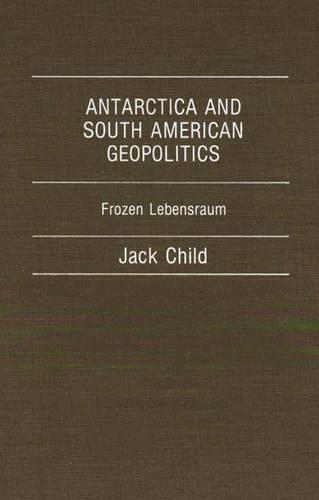
Antarctica and South American Geopolitics: Frozen Lebensraum
(Hardback)
Publishing Details
Antarctica and South American Geopolitics: Frozen Lebensraum
By (Author) Jack Child
Bloomsbury Publishing PLC
Praeger Publishers Inc
21st April 1988
United States
Classifications
Tertiary Education
Non Fiction
327.09989
Physical Properties
Hardback
248
Width 156mm, Height 235mm
595g
Description
Antarctica and South American Geopolitics examines the impact that geopolitical thinking in South America has on its policies towards the frozen continent, an impact which is considerable, especially among military regimes. Child demonstrates that the geopolitical approach has ramifications for conflict and cooperation, and his careful coverage of them provides one of the few sources available that directly analyzes the topic. The book opens with an introduction to the significance of Antarctica and its resources on the nature of South American geopolitics. Child's step-by-step analysis challenges the generally accepted view that Antarctica is a region of low political tensions--adding a new dimension to Antarctic policy analysis. He explains the specific policies of Argentina, Chile, and Brazil and other South American countries towards Antarctica. Finally, the author concludes by giving a larger picture of Antarctic antagonisms and alliances and by describing the possible results of current geopolitical thinking.
Reviews
Child, one of the few Americans who specialize in the international conflicts in the far south of Latin America, gives a succinct account of the historical background and geopolitical nature of a festering dispute between Argentina, Brazil, and Chile, involving Peru, the UK, and Uruguay as well. In Part 1 Child delineates the objective geopolitical factors underlying the conflict and then examines the subjective prism of the South American geopolitical thought through which these factors are seen. The latter is a masterly case study of geopolitical ideological thinking, which should be read by all who are vaguely concerned with Latin America or broadly interested in the deep impact which geopolitical ideas can have on international politics anywhere. In Part 2 the author focuses on the problem of Antarctica--the conflicting claims on its territory--as seen in Argentina, Brazil, Chile, and some other Latin American countries. The book is eminently suitable for use in seminars, undergraduate and graduate, but it is also useful as supplementary reading in any course dealing with the international relations of South America.-Choice
Jack Child's book is simply the best, most comprehensive analysis of South American geopolitics regarding Antarctica available in the English language, and although there is an extensive South American literature existing in Spanish and Portuguese, these works are primarily concerned with the geopolitical objectives and claims of the author's nations rather than overall analysis. Based for the most part on these indigenous sources, the work provides a brief but comprehensive review of South American geopolitical thinking, and action relative to the frozen continent, fitting them into the framework and context of regional and worldwide concepts for the future control, exploitation, administration, and sovereignty of Antarctica, as well as within the present Antarctic Treaty System (ATS). . . . Child's analysis is sound and his recommendations pertinent and well taken. Most important are his arguments that in order to understand and be able to predict future actions of these nations in Antarctica it is necessary to study and comprehend the influence of South American geopolitical thinking and action in regards to Antarctica. His book provides a worthy introduction to reaching such an understanding in non South American circles.-Inter-American Review of Bibliography
"Child, one of the few Americans who specialize in the international conflicts in the far south of Latin America, gives a succinct account of the historical background and geopolitical nature of a festering dispute between Argentina, Brazil, and Chile, involving Peru, the UK, and Uruguay as well. In Part 1 Child delineates the objective geopolitical factors underlying the conflict and then examines the subjective prism of the South American geopolitical thought through which these factors are seen. The latter is a masterly case study of geopolitical ideological thinking, which should be read by all who are vaguely concerned with Latin America or broadly interested in the deep impact which geopolitical ideas can have on international politics anywhere. In Part 2 the author focuses on the problem of Antarctica--the conflicting claims on its territory--as seen in Argentina, Brazil, Chile, and some other Latin American countries. The book is eminently suitable for use in seminars, undergraduate and graduate, but it is also useful as supplementary reading in any course dealing with the international relations of South America."-Choice
"Jack Child's book is simply the best, most comprehensive analysis of South American geopolitics regarding Antarctica available in the English language, and although there is an extensive South American literature existing in Spanish and Portuguese, these works are primarily concerned with the geopolitical objectives and claims of the author's nations rather than overall analysis. Based for the most part on these indigenous sources, the work provides a brief but comprehensive review of South American geopolitical thinking, and action relative to the frozen continent, fitting them into the framework and context of regional and worldwide concepts for the future control, exploitation, administration, and sovereignty of Antarctica, as well as within the present Antarctic Treaty System (ATS). . . . Child's analysis is sound and his recommendations pertinent and well taken. Most important are his arguments that in order to understand and be able to predict future actions of these nations in Antarctica it is necessary to study and comprehend the influence of South American geopolitical thinking and action in regards to Antarctica. His book provides a worthy introduction to reaching such an understanding in non South American circles."-Inter-American Review of Bibliography
Author Bio
JACK CHILD is Associate Professor of Spanish and Latin American Studies at the American University in Washington, DC.
